- Home
- Ricoh Global Newsroom
- Stories
- Ricoh’s Laser Technology Poised to Contribute to a Circular Economy by Revolutionizing Product Labeling
Products / Services
2022.09.06
Ricoh’s Laser Technology Poised to Contribute to a Circular Economy by Revolutionizing Product Labeling
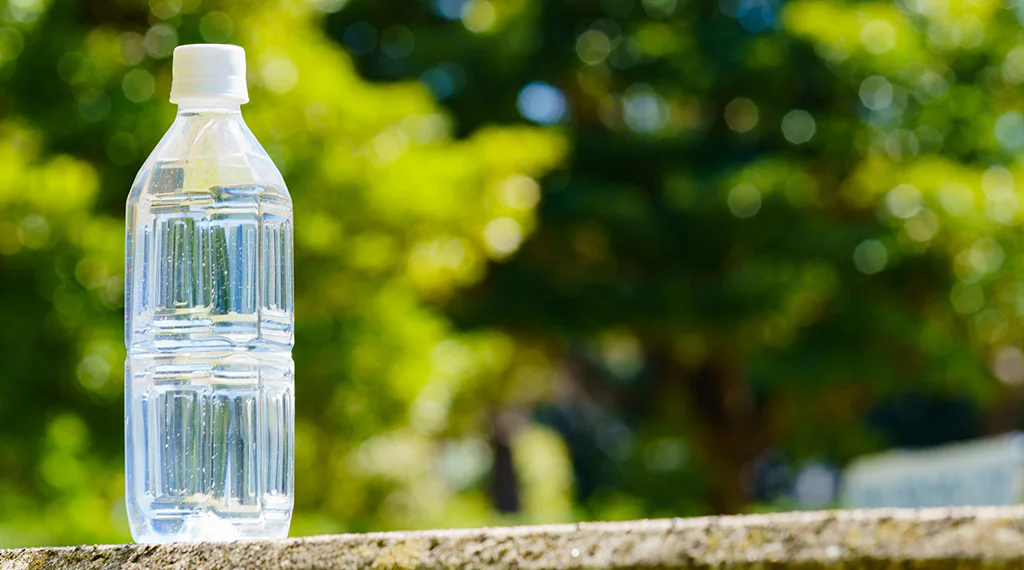
Contents
Ocean plastic pollution is one of the many threats that our environment faces. One solution to this issue is to recycle materials such as plastic bottles.
Properly recycling plastic bottles means removing the shrink labels, which is required in many countries, like Japan. Many people find it a hassle to remove the shrink labels from these bottles. Of course, we cannot just do away with product labels. They are needed to provide vital information about their contents.
These considerations prompted Ricoh to develop technology to laser mark transparent plastic and eliminate the need for shrink labels. We spoke with Yoshinori Hayashi, who heads the Resin Marking Project Team in Ricoh’s Advanced Technology R&D Division, and Satoshi Ogawa, a member of that unit, about why they set about developing laser printing technology for plastic bottles and where they see it heading.
Ricoh’s vision for a world without conventional labels
Ricoh has developed an alternative to shrink labels on plastic bottles, drawing on core printing technologies to laser mark information on bottle surfaces. This ink- and label-free process slightly changes the bottles’ surface, leaving necessary information in permanent white marks that are readable.
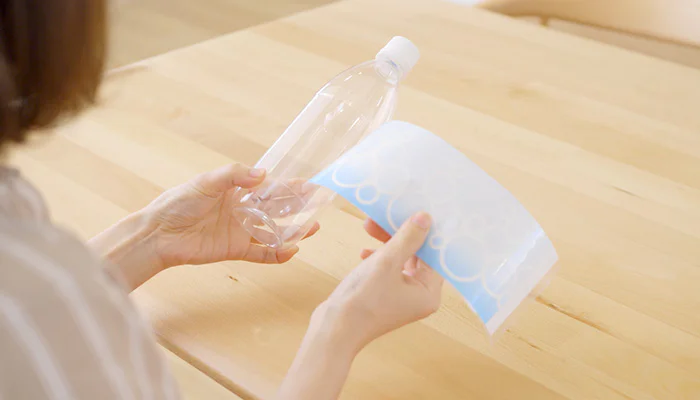
Ogawa says, “The biggest advantage of our technology for consumers is that it eliminates the need to remove shrink labels for recycling plastic bottles.” This convenience means that recycling rates would almost certainly increase if items were free of these labels from the beginning. Manufacturers participating in recycling processes would benefit, and no longer needing labels would conserve precious resources. Ogawa also anticipates that laser marking will enhance bottle designs, so people will consider reusing them instead of simply discarding them.
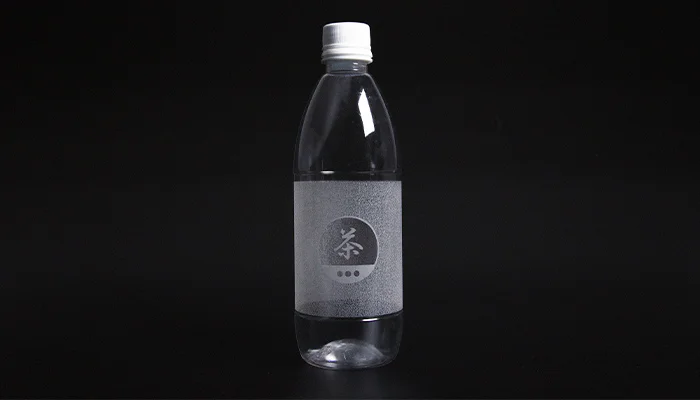
Project to resolve social issues began with employee insights
Ricoh embarked on developing label-free plastic bottle technology—that could help tackle the global issue of plastic waste—after considering employee suggestions to apply laser printing technology.
While beverage manufacturers have developed shrink label-free plastic bottles over the years, containers in Japan are required to disclose information in line with the Food Labeling Law and other regulations. Another challenge is that the guidelines of Japan’s Council for Polyethylene Terephthalate (PET) Bottle Recycling prohibit printing with ink directly on containers. This is to maintain the quality of recycled plastics. Manufacturers switching away from shrink labels have opted for tack seals or paper labels that they apply to bottles.
Extremely fine laser marking for text on plastic bottle surfaces
While technology already exists to laser mark plastic bottles, its use has been confined to printing basics like dates of manufacture because the printed dots are very large. Ricoh’s technology creates much finer dots, making it possible to clearly print beverage product names, ingredients, contact information, images, and other details.
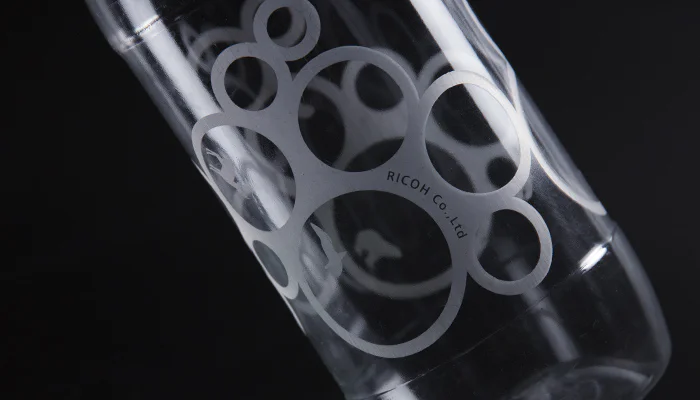
The surface penetration of laser marking is far less than the thickness of a human hair. The laser discolors the surface to scatter light and make letters and images appear white. Ogawa says, “Laser marking prints dots on plastic bottles. It essentially creates microscopic scratches that lead to good visibility without compromising the bottle strength.”
In November 2021, Ricoh and Asahi Soft Drinks Co., Ltd. , announced the creation of a 630ml size bottle for “Juroku Cha” blended tea that was the first in the food industry with laser-marked text and designs. The beverage company began test marketing 1,200 cases online. They soon sold out, winning acclaim from consumers for reducing waste and eliminating the need to spend time removing labels for recycling.
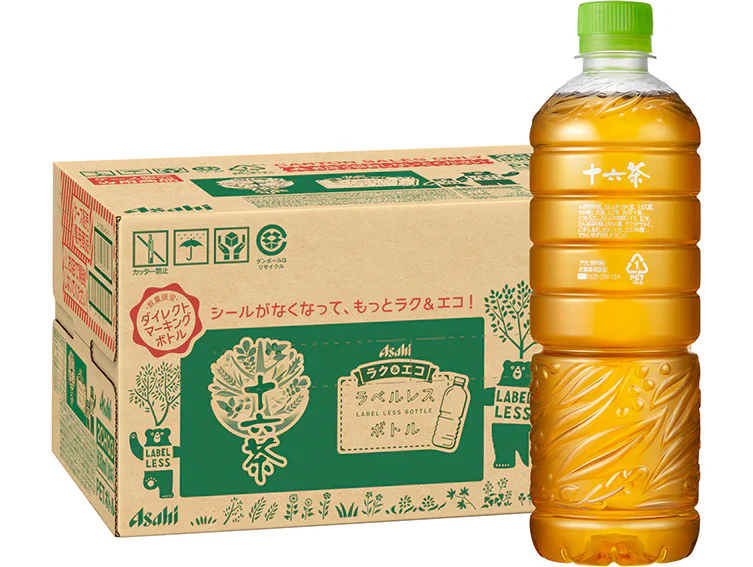
Applications potentially encompass everything from food containers to toiletries
Before leading the Resin Marking Project Team, Hayashi helped develop laser writing technology for printers. His experience has convinced him that Ricoh’s core technologies can contribute to creating a circular economy.
He is keen to push ahead, saying, “Valuable new businesses are the fruit of matching fundamental corporate strengths to market needs. Our laser marking technology is a perfect match in that regard. I believe our project can change the world.”
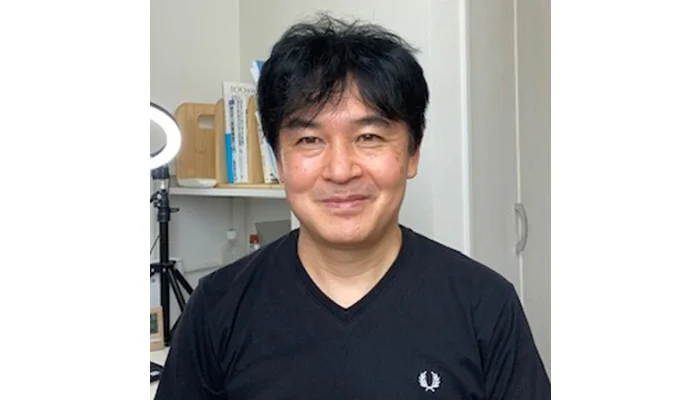
Yoshinori Hayashi, Leader of Resin Marking Project Team in Ricoh’s Advanced Technology R&D Division
Prospective applications for this laser marking technology extend beyond plastic beverage bottles to food containers, medical supplies, and toiletries packaging. Ricoh is working with several companies to produce laser-marked container samples and commercialize this technology.
Another potential use is on small production runs of bottles for events or novelty products.
Ogawa says that, “Laser marking makes it possible to quickly produce designs for runs of 1,000 bottles. You can also include beverage production and expiration dates in the designs and update that information on demand, which is very useful for manufacturers.”
Keeping up the effort to reach more consumers
Having contributed much to the test marketing success of Juroku Cha blended tea, Ricoh’s project team has turned its attention to enabling society to benefit from the convenience of shrink label-free bottles.
Ogawa notes that, “In managing a print technology project, I built a win-win business model for manufacturers and Ricoh by striking the right balance for initial installation costs, maintenance setup, and running expenses. I aim to draw on that experience to turn our laser marking technology into a business that benefits manufacturers, Ricoh, and end users.”
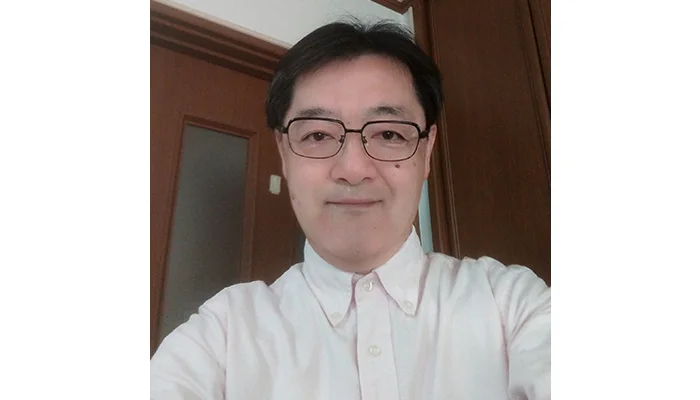
Satoshi Ogawa, a member of the Resin Marking Project Team in Ricoh’s Advanced Technology R&D Division
For wider application of its laser marking technology, Ricoh will need to keep working on it to match the regular beverage production line capacity of 1,000 bottles per minute. The project team is thus constantly exploring ways to reach that goal.
Feedback from users of shrink label-free plastic bottles would also contribute to the drive to develop the technology. Commercial sales would be vital to such progress. Says Hayashi, “We still have to address a lot of cost and technology issues, so we now need establish a mass production structure and make high-quality shrink label-free plastic bottles truly practical.”
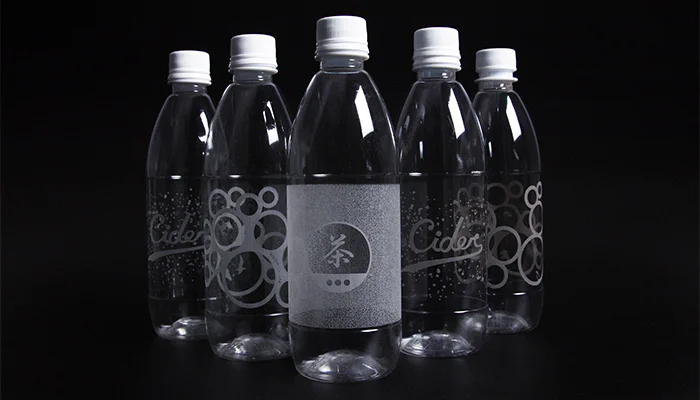
He adds that, “If we can help simplify containers and packaging that currently carry excess information, we can foster progress toward Sustainable Development Goals. I hope our technology can be part of making the world become a much better place.” Hayashi and his project team are determined to keep forging ahead as part of Ricoh’s drive to contribute to a circular economy.